 Sandra Cano is an electronic engineer and has completed a master’s degree in computer engineering. Also, she has received the PhD from the University of Cauca, Colombia in 2016. She received her degree in Doctor in Electronic Sciences from the same University in December 2016, where she was working in the research area Human Computer Interaction, with hearing impaired, titled Methodology for designing serious games for children with cochlear implant “Metodología para el diseño de juegos serious para niños con implante coclear“. However, she worked with children with cochlear implants and children whose communication is sign language, where she developed a methodology for designing serious games for deaf children called MECONESIS.
Sandra Cano is an electronic engineer and has completed a master’s degree in computer engineering. Also, she has received the PhD from the University of Cauca, Colombia in 2016. She received her degree in Doctor in Electronic Sciences from the same University in December 2016, where she was working in the research area Human Computer Interaction, with hearing impaired, titled Methodology for designing serious games for children with cochlear implant “Metodología para el diseño de juegos serious para niños con implante coclear“. However, she worked with children with cochlear implants and children whose communication is sign language, where she developed a methodology for designing serious games for deaf children called MECONESIS.
She has been working in university educational issues in the Superior School of engineering in Multimedia program, University of San Buenaventura Cali, from 2015/06 to 2019. Now she is teacher in the school of computer engineering at Pontificia Universidad Católica Valparaiso, Chile. In 2002, she obtained an AECID scholarship for a research stay at the school of electronics of the university of Bilbao (Spain). She designed a board and system of data acquisition using microcontroller Microchip 16F877.
Also, she was working with Altera, LabView and Matlab. Also at the undergraduate level, she belonged to educational robotics groups, in the project Design and implementation of the software and interface for the manipulation of the didactic mobile robot MOVIT 961 WAOII from a PC.
+ Studies
- Master in robotic and automatization – Universidad Internacional de Valencia, Spain (2023-2024 ) TFM: Control Óptimo para la estabilidad de un robot móvil usando algoritmos de aprendizaje por refuerzo.
- Diploma in mental health and psychiatry – Universidad Autónoma de Chile (2021)
- Diploma in training in play and creativity for early childhood early childhood- Universidad San Buenaventura de Cali (Colombia) (2018)
- Doctorate in electronic science. Universidad del Cauca (2013-2016). Research topic: Human-Computer Interaction.
- Master in engineering emphasis on systems. Pontificia Universidad Javeriana de Cali (2009-2013). Research topic: patterns recognition.
- Telematics specialist – Universidad Autónoma de Occidente Cali – Universidad del Cauca (2008)
- Electronic Engineering – Universidad Autónoma de Occidente Cali (1997-2002)
For twelve years, she worked in a private enterprise as webmaster, analyst, web developer and web and mobile developer and consultant. She has participated in I+D+i projects national and international.
Research Fields: Human-Computer Interaction (HCI), Human-Robot Interaction (HRI) and Emotions.
Contact: sandra.cano@gmail.com, sandra.cano@pucv.cl
Github: https://github.com/sancano22
ORCID: 0000-0001-9583-8532
Actually, she is creating the human-machine interaction laboratory
Awards
- Atlas Elseiver Award with the article “Digital Transformation to support literacy teaching to deaf children: from storytelling to digital interactive storytelling” [https://www.elsevier.com/connect/atlas/a-digital-storytelling-app-for-the-deaf] , 26 – sept 2019
- Award in Research “Guillermo de Ockham” 2019-2, in the category award of product with the great social impact, 26- sept 2019
Research stays
- 2017: Université d’Illes Balears. Working Designing Interactive Experiences for People with Special Needs . (Spain)
- 2018: Universidad de Zaragoza – Teruel. Working in Analysis of Emotions in Physiological Signals in Thinking Computational. (Spain)
- 2019: Universidad Autónoma de Manizales with Research Group in Neuro-Learning. Working in the Study of EEG signals with ERP, Eye-Tracker and Cognitive-Emotional Processes. Neurophysiology Laboratory. (Colombia)
Hobbies
Write and Literature, she has a literature blog, about the different books she reads. Librosdearena.com
INTERACTIVE SYSTEMS
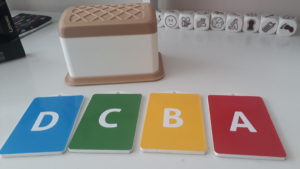
TRUNK OF MEMORIES is a physical and digital interface to interact with a pervasive game for elderly.
Today, this project is being developed with PUCV students and PhD student at university of Granada (Spain).
Publications
Salazar-Cardona, J.A.; Cano, S.; Gutiérrez-Vela, F.L.; Arango, J. Designing a Tangible User Interface (TUI) for the Elderly Based on Their Motivations and Game Elements. Sensors 2023, 23, 9513. https://doi.org/10.3390/s23239513
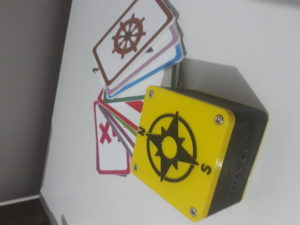
SKILL-COMP, is a physical and digital interface to interact with a video game through a set of instructions where the player must give instructions for the movement of a character. This interactive system was created for the development of computational thinking skills for elementary school children.
This prototype has two versions. Now i’m finishing the version 2.0 with RFID Cards and IoT. The game is developed in Unity.
This project was developed with students of University of San Buenaventura Cali.
Publications
Sandoval, D. F., Lara, M. J., & Cano, S. (2018). Hacia el diseño de un Sistema Interactivo basado en Interacción Tangible como apoyo al desarrollo de competencias del pensamiento computacional para niños en aulas regulares entre 9 a 10 años. Publicaciones E Investigación, 12(2), 11–22. https://doi.org/10.22490/25394088.2964
CLAVES DE FITZGERALD
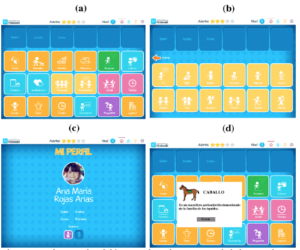
This project includes a mobile app for deaf children based on Fitzgerald Keys a methodology of teaching to learn literacy. The application was developed in Android Studio with database in SQLite. Nowadays, the application is being modified and and improvements are being made so that it can be published, as many teachers and researchers have asked us for a version of the application.
Video |
FONOMAGICA
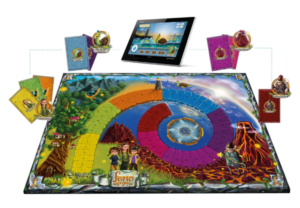
This project includes the participatory design, which can help to design centered in the user needs, as children with hearing impairment. This project was developed with students of design at University Unicauca (Colombia)- Year: 2016
Publications
Cano, S., Collazos, C.A., Flórez Aristizábal, L., Gonzalez, C.S., & Moreira, F. (2017). Towards a methodology for user experience assessment of serious games with children with Cochlear Implants. Telematics and Informatics, 35(4), 993-1004. doi: 10.1016/j.tele.2017.09.011
ROBOTS FOR EDUCATION
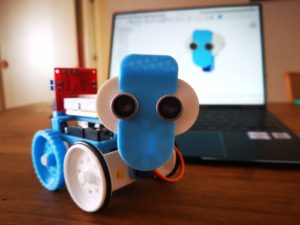
COODI is a project to develop STEAM skills for children. Actually, it is designing a methodology to teach STEAM skills using COODI robot. COODI is a low-cost robot where children can build and program Cliqui. The robot is made with 3D printed and with the concept DIY.
ROBOTS FOR SOCIAL-EMOTIONAL SKILLS
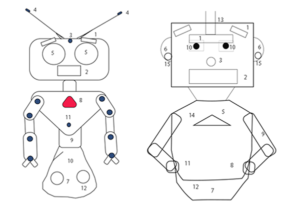 EMOWY (EMOtional With You) is a project which is building a social robot for children with ASD. The main objective is to design a social robot using open-source robotic platforms. The design of the social robot will be focused on supporting therapies for children with ASD.
EMOWY (EMOtional With You) is a project which is building a social robot for children with ASD. The main objective is to design a social robot using open-source robotic platforms. The design of the social robot will be focused on supporting therapies for children with ASD.
Publications:
Cano S, González CS, Gil-Iranzo RM, Albiol-Pérez S. Affective Communication for Socially Assistive Robots (SARs) for Children with Autism Spectrum Disorder: A Systematic Review. Sensors (Basel). 2021 Jul 30;21(15):5166. doi: 10.3390/s21155166. PMID: 34372402; PMCID: PMC8347754.
Cano, S.; Díaz-Arancibia, J.; Arango-López, J.; Libreros, J.E.; García, M. Design Path for a Social Robot for Emotional Communication for Children with Autism Spectrum Disorder (ASD). Sensors 2023, 23, 5291. https://doi.org/10.3390/s23115291
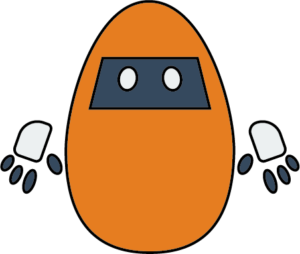
WAWY (We Are With You) is a bot centered in mental health for students of higher school. It is project working with University of San Buenaventura Cali (Colombia).
This virtual assistant is developed with RASA framework.
WORKSHOPS FOR THE COMMUNITY WITH SOCIAL IMPACT
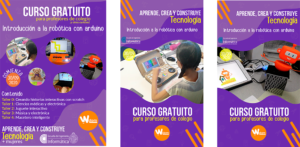
Teaching STEM Skills
A set of workshops were designed with kits to introduce concepts such as electronic and programming for teachers. Therefore was designed an electronic kit using Arduino UNO to build some prototypes such as: Interactive toys, health and electronic (heart rhythm simulation and capturing physiological responses), music & electronics and finally smarter planter.
Website | Workshop 1 | Workshop 2 | Workshop 3 | Workshop 4
E-textil with a gender approach
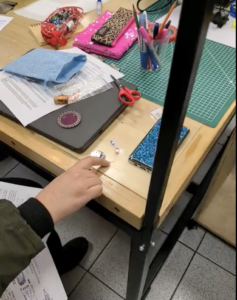 This workshop was designed using Lilypad Arduino.
This workshop was designed using Lilypad Arduino.